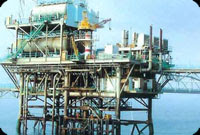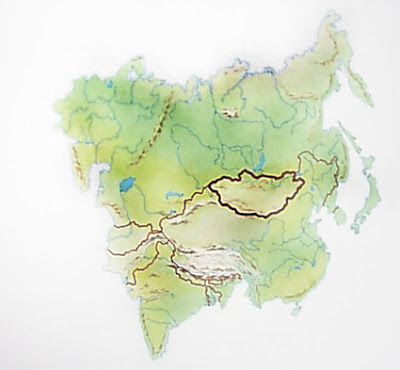 With Dmitry Medvedev's virtually assured victory in the presidential election just three days away, President Vladimir Putin indicated on Thursday that his protege's efforts at solving some of the country's most pressing social problems had helped pave his way to the country's top job.
With Dmitry Medvedev's virtually assured victory in the presidential election just three days away, President Vladimir Putin indicated on Thursday that his protege's efforts at solving some of the country's most pressing social problems had helped pave his way to the country's top job.While Putin was trumpeting the success of the so-called national projects to improve conditions in health care, education, housing and agriculture, questions remained as to the real impact they had made on the lives of average Russians.
"The way it was in the Soviet Union, if you wanted to finish off someone's political career, you put him on social projects," Putin told the National Projects Council in the Kremlin's Alexander Hall.
Medvedev, in contrast, had, "succeeded in doing targeted, systematic work," he added.
Coverage of the projects has definitely kept Medvedev in public view. He had been competing for airtime with fellow First Deputy Prime Minister Sergei Ivanov until Putin endorsed him in December, after which Medvedev enjoyed pride of place in national television coverage.
Putin will likely drop in for the victory celebration at Medvedev's campaign headquarters Sunday, a presidential administration official said Thursday on condition of anonymity, as he was not authorized to comment. The move would be in stark contrast to the victory party at United Russia headquarters for the Dec. 2 State Duma elections, where Putin was a no-show even though his was the sole name on the party's national list.
Under a gilded dome decorated with imperial eagles whose two heads face in opposite directions, Putin and Medvedev, seated next to each other, often put their heads together for quiet exchanges over the presentation.
After Putin delivered the opening address, Medvedev got up to speak at a lectern. Like the ministers who followed, he reeled off statistics to show that the projects under his charge had changed Russians' lives for the better.
Medvedev said Russians had seen for themselves that the projects were not just "pre-election PR from the authorities" or "pure populism," as they had been viewed initially by the public.
"Still, people have seen changes, perhaps not so large, but real all the same," he told a gathering of ministers, governors and other officials. "I think this level of trust is an obligation and gives us a real opportunity to achieve more."
He was followed by a line of officials who took turns announcing mind-numbing lists of results in their areas of responsibility.
Gazprom CEO Alexei Miller, for example, said 13 million more Russians received gas to their homes as a result of the company's work since 2005, raising the level of homes being served to 62 percent from 54 percent.
Education and Science Minister Andrei Fursenko said all of the country's schools now had Internet access, while Health and Social Development Minister Tatyana Golikova said the country's health sector had benefited from reforms the likes of which had not been seen in 20 years, with total spending of 182 billion rubles, or $7.5 billion over the last two years.
"Significant work is behind these boring figures," Medvedev said. "This is our long-term policy."
While Medvedev was trumpeting the successes Thursday, not everyone was so convinced.
Dmitry Sorokin, first deputy director of the Economics Institute at the Russian Academy of Sciences, said "increased PR" had essentially become the main result of the two-year projects. Citing a study by the Academy's Center for Banking and Financial Research, he said the amount committed to addressing the problems was meager.
"I don't see real improvements," he said. "The country is undergoing a slow degradation."
Sorokin's boss, Ruslan Grinberg, who heads the Academy's Economics Institute, went even farther with his criticism, saying the system itself was the problem.
"It sometimes seems like democracy is a virtue in itself," he said by phone. "It is practical; it's useful. It provides the ability to correct mistakes."
Earlier this week, Grinberg and Sorokin were two of the authors of a report commissioned by a little-known think tank called the Center for the Development of Information Society.
Thursday's edition of Nezavisimaya Gazeta covered the report's contents, which focused on the lack of political opposition in the country and the need to change course.
"The only reasonable way to change the economic course is the existence of party opposition, which can attain power with different principles of economic policy," Grinberg was quoted as saying in a rare public statement of discontent with Kremlin policy from academic circles. "Without this, Russia is regularly pushed into crises like the 1998 default, which could have been avoided."
Grinberg said Thursday that he still had not decided whether he would vote Sunday.
"I like [Medvedev]," he said, "but this [election] doesn't make me very enthusiastic."
Drumming up enthusiasm did not seem like much of a problem for most of those on hand Thursday.
Kaliningrad Governor Georgy Boos said he would vote for Medvedev without a second thought, while Alexander Shokhin, head of the Russian Union of Industrialists and Entrepreneurs, said he and most members of the country's biggest business lobby group would vote for Medvedev and the stability he represented.
Asked what the structure of power might look like in a Medvedev presidency, both Boos and Shokhin said they had no clear idea.
"Life's wise," Boos mused. "It will sort everything out."
Putin aide Igor Shuvalov added with a smile: "We are in for a very interesting time."
Source: The Moscow Times|By Anna Smolchenko

















 El pulso mantenido durante estas semanas entre la todopoderosa petrolera
El pulso mantenido durante estas semanas entre la todopoderosa petrolera 


